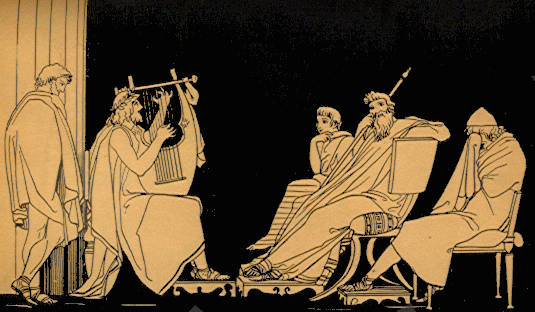No shows for 10 weeks and then 4 shows in 4 days: This was the busy dawning of my 2019 Odyssey schedule.
This is also the third year of keeping this blog, which so far has amounted to 55 dispatches. I'd ultimately like to turn my Odyssey-related writing into something more formal and substantial so I've been going back through these posts and starting to collect them around themes and look for places I can combine and further elaborate on some of the ideas and experiences I've documented here.
I've written about the Odyssey in the context of its relationship to veterans in a couple of places: these posts about my trip to California to perform at Marines Memorial Theatre and also in this post about a performance in Austin in which I also related an earlier show at which a high school student connected her experience "re-meeting" her veteran father after his deployment to Iraq with Telemachus' experience of "re-meeting" his veteran father in the Odyssey.
One of my favorite scenes of the poem, in fact, the one I begin each performance by deconstructing for my audience, is this one from book VIII (which I wrote about here too):

At its simplest, this scene shows us a veteran weeping at the sound of a war story, some ten years after the end of the war in which he fought.
It's a beautiful, poignant, layered portrayal of what I've come to understand is an emotional experience that has likely remained little changed in many ways in the 3000 plus years since the Homeric epics were created.
So at my show at UIC on a winter Friday evening for a class studying Greek tragedy and reception, I began with this scene. I pointed out a couple of aspects of what is shown and asked the students to think about them as discussion points for after my performance.
In a small severe concrete classroom I began singing and made my way through the familiar arc of my songs, which I wrote so long ago now that they don't feel like mine.
Which they aren't really: they belong to a tradition and most of all to the audience.
After I finished, the class launched into an excellent discussion, much of which centered around comparing Odysseus' homecoming to the (disastrous) homecoming of another Trojan war king, Agamemnon (the class had just finished reading the Oresteia and the Odyssey itself repeatedly contrasts Agamemnon's nostos (homecoming) with Odysseus').
Afterwards, as the class filed out, a student who had been sitting in front lagged behind a bit and approached me.
He said he enjoyed the performance and that he had connected deeply and emotionally around the meaning of home and homecomings for soldiers and veterans because he himself was in the military and being deployed shortly.
Moments like that, connections filled with meaning that stretch across thousands of years, take my breath away. This is what lit the fire I have for this material, this powerful and humbling revelation that humanity has always been grappling with largely the same set of issues: issues of what it means to be home, issues of what it means to just plain be, issues of mothers and fathers and sons and daughters... and issues of war and warriors crying at songs about their fallen comrades, warriors going to war wishing for nothing more than a safe homecoming.
I wish that safe homecoming to my audience member and all those like him.
